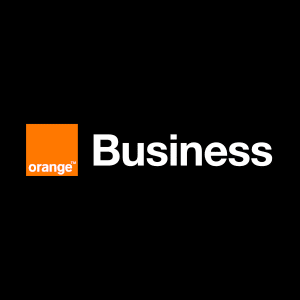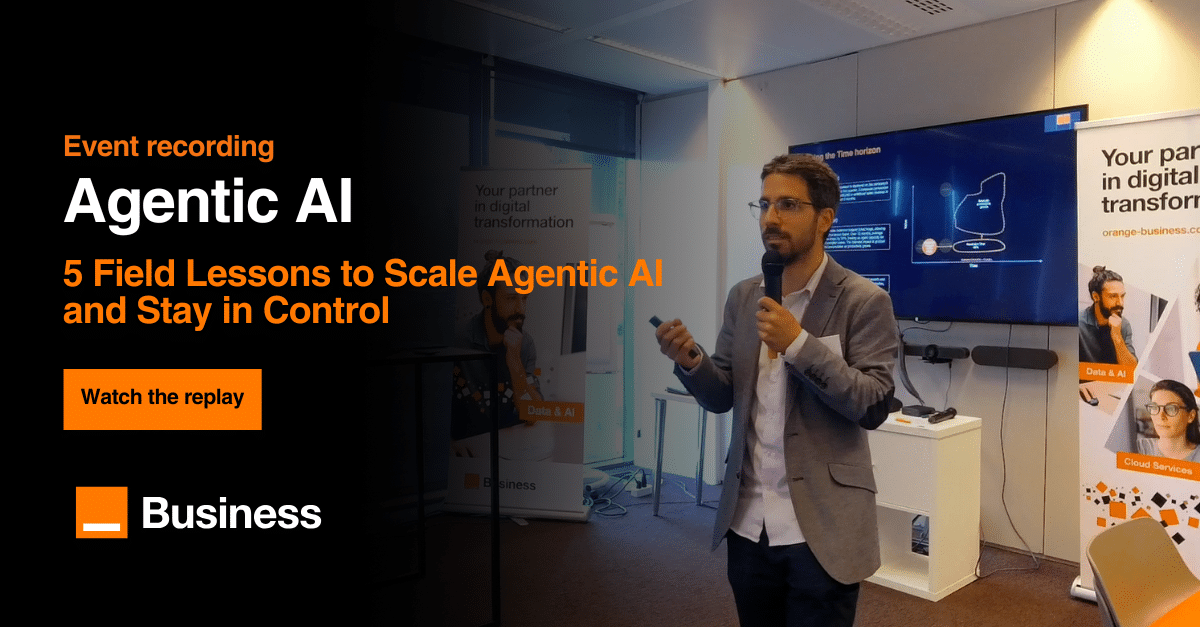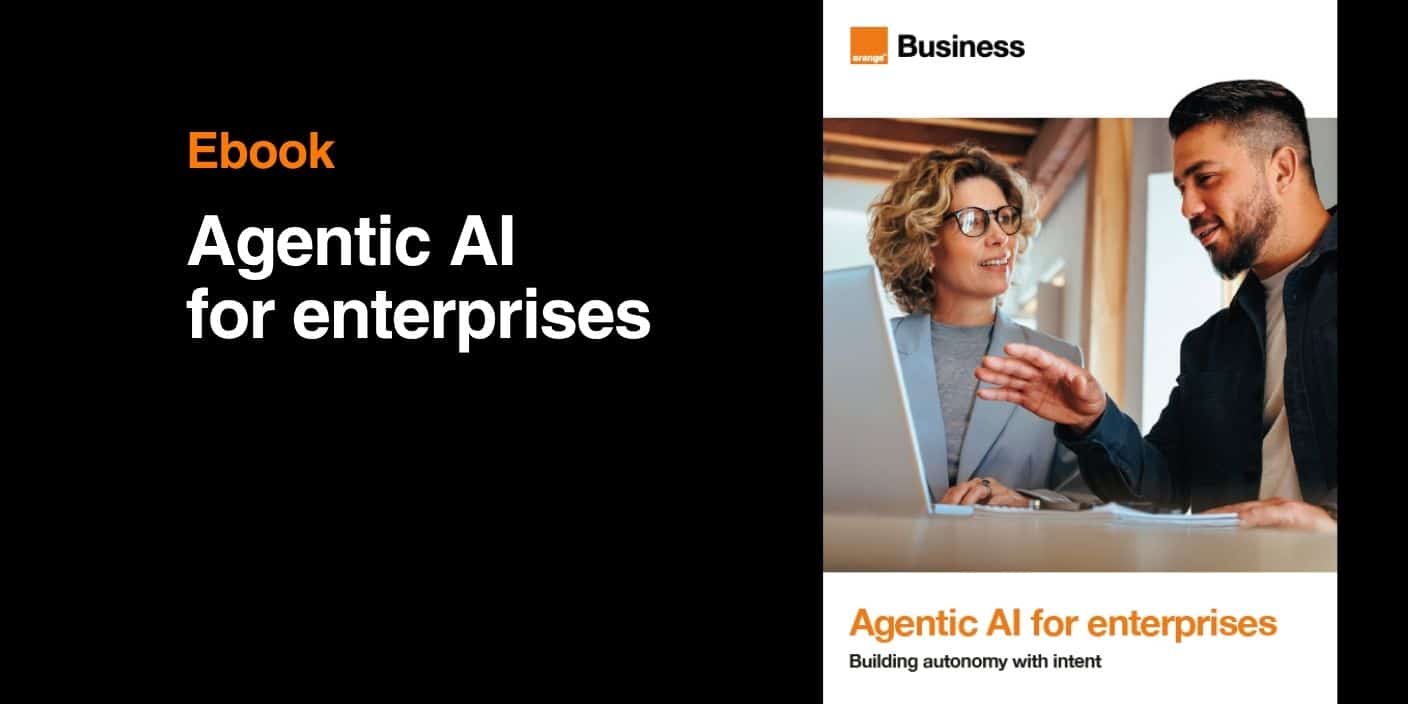The generative AI market is still very young. As a result, the number of players remains relatively limited for now. Two main categories stand out: the GAFAMs on one side, and start-ups on the other. Why are there so few mature players in this field? Because in artificial intelligence, the real battleground lies in access to data…

From impacts to challenges: generative AI in business
See moreThis is a key point about generative AI: to develop and train Large Language Models (LLMs), the most critical factor is the volume and quality of the data available. Even giants like Apple and Amazon face a relative shortage of data, as they do not directly operate an open, global-scale online ecosystem like Microsoft, Meta, or Google. As a result, only a handful of companies currently share most of the market’s potential.
It would be impossible to cover all players exhaustively. We have therefore selected the following solutions, which are among the most advanced in LLMs and generative AI.
To develop and train LLMs, the most important factor remains the volume and quality of the data at hand.
Startups and generative AI
It is true that startups are not the best equipped when it comes to data. Still in an exploratory phase, their strong capacity for innovation and inherent agility allow them to move quickly in this field. In this article, we have chosen to focus on four “promising” startups:
- Mistral AI
- LightOn
- Aleph Alpha
- Hugging Face
Mistral AI
Co-founded by Arthur Mensch (CEO) and Guillaume Lample (Chief Scientist and former Research Scientist at Facebook under Yann Le Cun), Mistral AI is a French company. Its ambition is to create and share cutting-edge AI models capable of generating high-quality natural language from any input (text, images, audio, etc.). As of July 2023, however, Mistral AI had yet to release a concrete solution.
LightOn
Another French company, LightOn was co-founded by Laurent Daudet, Igor Carron, Florent Krzakala, and Sylvain Gigan. LightOn provides foundation models to support augmented work and creativity, leveraging exascale hardware and insights from deep learning and transformers. Their flagship product, Paradigm, is a robust and reliable solution for organizations using hosted language models for natural language processing (NLP) tasks. It offers the benefits of private models, such as data control and the ability to tailor the model to specific needs. A key advantage of this approach is enabling transfer learning on private and sovereign data corpora.
LightOn recently established a partnership with Aleia, another French startup, to deliver a secure, industrial, and European offering of large language models. Available from late 2023, this initiative aims to revolutionize industrial AI by integrating large language models into established AI processes.
Aleph Alpha
Germany is also advancing in generative AI through Aleph Alpha, co-directed by Jonas Andrulis and Samuel Weinbach. With their Luminous solution, Aleph Alpha has reached a significant milestone toward high-performing, explainable, and trustworthy AI. Their new features, AtMan and Explain, are the first of their kind on the European market, designed to strengthen trust in generative AI and improve understanding of how large language models function. As of 2023, Aleph Alpha is mainly focused on the German market and is working in France through a partnership with HPE.
Hugging Face
Hugging Face is an American company headquartered in the United States but founded by three French entrepreneurs: Clément Delangue, Julien Chaumond, and Thomas Wolf. It is both a community and a data science platform that provides tools for building, training, and deploying ML models using open-source code and technologies. Hugging Face is the creator of Transformers, an open-source library that enables the development of generative AI models. Notably, some Hugging Face models have already been integrated into Microsoft Azure.
The GAFAMs at the forefront of generative AI
It is impossible to talk about generative AI without mentioning the hyperscalers, starting with OpenAI and Microsoft (GPT-4), Meta (LLaMA2), and Google (PaLM 2).
OpenAI and Microsoft
By investing ten billion dollars in the American startup, Microsoft has positioned OpenAI as the leader in generative AI. While ChatGPT is now integrated into Bing and Azure, Microsoft has also added its own additional security layers compared with the public version of the solution.
Using ChatGPT implicitly means accepting that the information entered in a prompt may later be reused as part of other responses. In this way, ChatGPT could potentially reuse personal or sensitive data that was shared with it, which could conflict with GDPR requirements.
This is where Azure OpenAI makes a major difference. It embeds information security and guarantees that the data provided will only be used by the company’s own users. Microsoft therefore ensures confidentiality when using Azure, backed by its standard enterprise-level security commitments.
Google Bard AI
Considered Microsoft’s main competitor, Google long held the top spot among web giants thanks to the strength of its search engine. Today, however, its business model could be significantly disrupted by Microsoft.
In response to ChatGPT, Google launched its own generative AI tool, Bard, in early 2023. Initially available only in the United States and a few other countries, Bard has been accessible in Europe and Brazil since July 13, 2023. While it is possible to test the solution in French, the European version is still experimental and does not yet include all features. It therefore cannot be directly compared with other solutions on the market. One of Bard’s strengths, however, lies in being permanently connected to the web, which sets it apart from its main competitor, ChatGPT.
Meta
In February 2023, Meta also entered the generative AI race by making its own language model, LLaMA (Large Language Model Meta AI), available to the research community. More recently, LLaMA2 was released as open source and made available for commercial use.
Built on smaller but efficient models, LLaMA2 could reshape the LLM landscape, as many companies may be tempted to train it on their own proprietary text corpora. The benefit is greater control and transparency over data sources, especially for chatbot applications. As a result, numerous variants, or forks, of LLaMA2 are likely to appear in the coming months.
What are the current limitations of generative AI in business?
Although generative AI is currently driven by the largest web giants, the main challenge for companies is to work with solutions that guarantee data confidentiality and end-to-end control of the information chain, including sovereignty of the provider. Yet most of today’s market solutions are subject to the Cloud Act or show a certain opacity in how shared data is managed, if not in the data used for training.
It is worth remembering that knowledge is not just a matter of quantity. When it comes to data, quality is equally critical. One key aspect is completeness: the training corpus must include multiple independent dimensions in order to provide information, or even knowledge, that is as diverse as possible.
The issue is that the web today does not necessarily generate enough genuinely new knowledge, either in quality or in volume, to allow for the endless increase of model parameters as a way to improve performance (see Vapnik’s principle discussed in a previous article). As a result, companies may soon face the limits of generative AI, regardless of the computing power behind market solutions.
Between open-source solutions from Meta and Hugging Face, startups working on highly promising innovations, and the advances of the GAFAMs constantly challenging one another, the future of LLMs seems assured. In April 2023, AWS responded to Azure OpenAI by unveiling Amazon Bedrock. Announced as highly cost-efficient thanks to the use of in-house chips, the service also guarantees the security and confidentiality of user data. At the same time, Amazon launched an acceleration program for ten startups focused on generative AI.
Even Apple, at its own pace, appears to have recently entered the generative AI race with AppleGPT. True to form, Apple remains highly secretive on the subject, but with Siri showing its age, the competitive stakes around generative AI in the coming years are set to be significant for the company.















Comments (0)
Your email address is only used by Business & Decision, the controller, to process your request and to send any Business & Decision communication related to your request only. Learn more about managing your data and your rights.